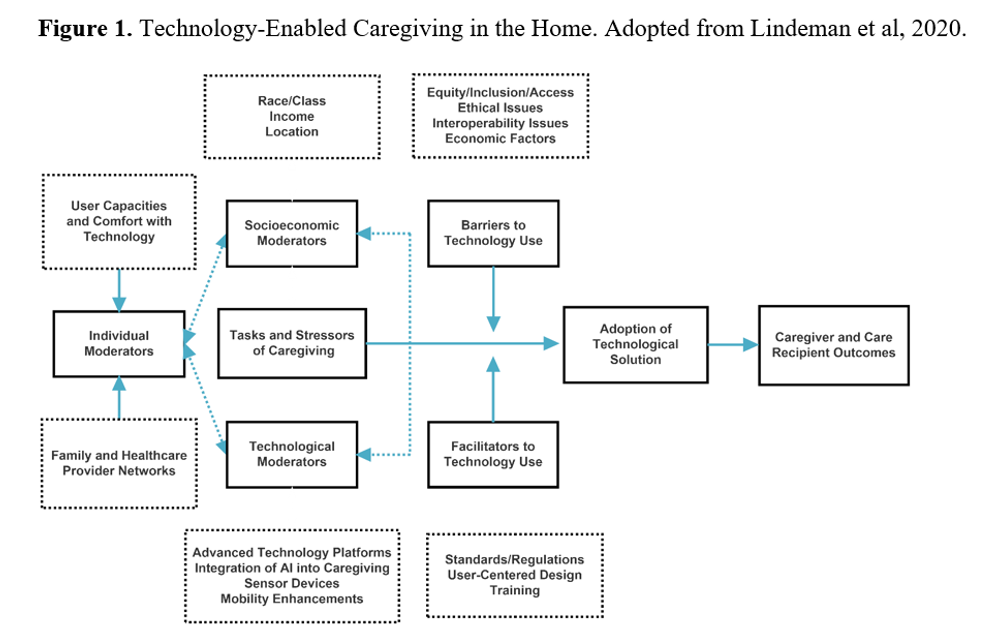The goal of this 12-month Phase 1 project, being done in collaboration with Generation Connect, a gerontology-focused software development company, and UW-Madison School of Pharmacy, is to develop an innovative technology solution to help improve clinical outcomes, reduce overall healthcare costs, and lower out-of-pocket costs for persons living with dementia.
As part of this grant, Generation Connect has enhanced the Care Team Connect (CTC) mobile app solution to address three key technology initiatives: (1) develop mobile app features that prompt care teams (informal care partners and formal caregivers) to participate in evidence-based engagement strategies (e.g., music, reminiscing, socialization ) (2) deploy HIPAA-compliant tablets to help care teams personalize these engagement routines, and (3) integrate clinical assessment tools to streamline data collection related to clinical outcomes for PWD and their caregivers.
For this project, Dr. Ford and his research team conducted qualitative data analysis and contributed to the interpretation of the study findings. Specifically, Dr. Ford and his team led efforts to evaluate the usability of the CTC app and the qualitative analysis of focus groups and individual end-user interviews.
Generation Connect and the UW team are in the process of applying for Phase II funding.
This is an accordion element with a series of buttons that open and close related content panels.
Background
support for their care and are increasingly vulnerable to institutionalization. The Centers for Medicare & Medicaid Services (CMS) is transitioning long-term care services from institutional care to home-or community-based services, including expanding Medicare Advantage (MA) plans to include non-clinical services as reimbursable supplemental benefits. To live at home longer, PWD require support from: (1) formal caregivers (i.e., paid professionals) who often lack knowledge of PWDs’ personal histories and have high turnover, and/or (2) informal care partners (e.g., family or friends) who may have difficulty coping with behavioral and psychological symptoms of dementia (BPSD) (e.g., aggression, anxiety).
Although technological solutions can focus on BPSDs, formal caregivers/informal care partners in home care underuse such resources. If frontline caregivers in home care settings more routinely used technology that addresses social engagement and data collection for PWD and caregivers, this could result in decreased BPSDs and reduced transitions from in-home care.
Aims
Aim 1: Develop key CTC app features to increase informal care partner usage.
Milestone 1: User-generated engagement content will be added to the CTC app from informal care partners for at least 66% of the care teams using the enhanced version.
Aim 2: Develop and evaluate the usability of an assessment module to collect clinical outcomes. Milestone 2: We will integrate psychometrically validated tools in the CTC app, and elicit feedback that assures that assessment modules are intuitive (user-friendly) and practical (useful for data collection) from at least 50% of key stakeholders.
Scope
In this Phase 1 SBIR grant, Generation Connect (GC)–a gerontology technology company that develops personalized dementia care engagement solutions–will begin to meet this need by completing a three-part process. First, GC will develop and refine a Care Team Connect (CTC) mobile app to prompt PWD and informal care partners to create a collection of personalized photos, stories, and music preferences for PWD engagement. Second, GC will integrate clinical assessment tools into the CTC app to streamline data collection related to clinical outcomes for PWD and their caregivers. Finally, GC will station tablets with the CTC app in the home to help formal caregivers enhance engagement routines.
Conceptual Framework
The Technology-Enabled Caregiving in the Home (TECH) framework will be used to examine key features that influence caregivers’ utilization of the CTC app and contribute to PWD and caregiver outcomes. These key features include: (1) Individual, socioeconomic, or technical moderators, (2) barrier or facilitator mediators, and (3) technology-related measurement. Using insights from focus group sessions, informal care partners will increase the utilization of the CTC app, resulting in an increased amount of user-generated engagement content added to the CTC app. Semi-structured interviews of formal caregivers and case managers will ensure an intuitive and practical CTC app for collecting data related to PWD cognition and BPSD, and formal caregiver well-being.

Methods
This 12-month Phase I project consists of two Aims. Activities will be guided by a participatory design (PD)37-39 approach to develop a person-centered mobile app to improve cognitive, psychological, and behavioral well-being among PWD, as well as caregiver well-being and efficiency. PD emphasizes co-design in which all stakeholders (e.g., technology developers and end-users) work with the PI and Co-I researchers throughout the design process in an iterative fashion, with all stakeholders critically examining modifications throughout the design process and making adjustments.39 The use of PD methods in the development of health-related technology involves three stages: Stage 1: initial exploration of work, Stage 2: discovery processes (working together), and Stage 3: prototyping.39,40-42

In our project, the initial exploration of work (interviews to develop a better understanding of existing processes and needs) and discovery process (collaborative activities to determine the goals for the use of the CTC solution) will involve approximately 60-minute focus group sessions with project stakeholders. Topics include, but are not limited to, how the CTC app could address the provision of non-clinical home care services (personal care) under MA plans; alleviate issues associated with home care provider staffing; improve informal and formal caregiver stress; and improve formal caregivers’ ability to track clinical outcomes related to cognition, BPSD, and caregiver well-being.
Research Team
Principal Investigators
- Michael Potteiger (small business PI)
- Jay Ford (academic PI)
Co-Investigator
- Aaron Gilson
Research and Other Staff
- Michele Gassman
- Debby Dodds
- Robin Lombardo
Grant information
This project was supported by grant number 1R43AG071060-01 from the National Institute on Aging. The content is solely the responsibility of the authors and does not necessarily represent the official views of the National Institute on Aging
